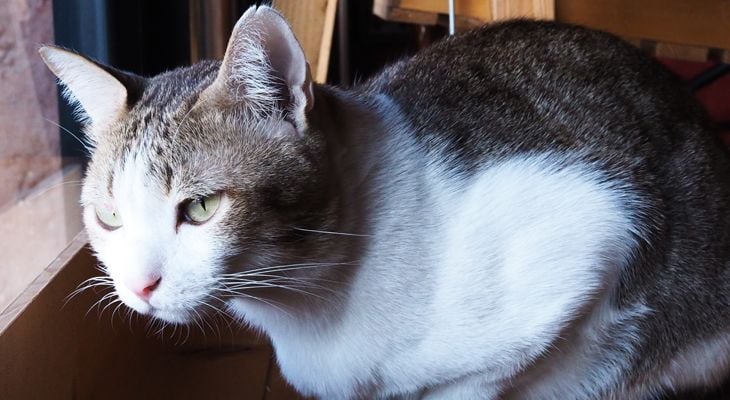
Feline leukemia virus (FeLV) is a retrovirus that, like feline immunodeficiency virus (another retrovirus), produces an enzyme known as reverse transcriptase, which allows the retrovirus to inject duplicates of its own genetic matter into the cells it has corrupted.
Though closely related, because a number of the diseases triggered by feline immunodeficiency virus (FIV) and FeLV are similar, they differ in many ways. For instance, when seen under a microscope, FIV is elongated and FeLV is rounder. They also contrast in their genetic material and protein composition. More defining are the ways in which they are triggered. For the purpose of this article, we will focus specifically on FeLV, which is the most common cause of cancer in cats, and may cause blood disorders or weaken a feline’s immune system, leading to infection and secondary diseases.
This particular virus can be transferred between cats through a variety of ways, including:
- Nasal discharge
- Fecal matter and urine
- Saliva (which can be shared through mutual grooming)
- Milk (passed from an infected mother cat to her kitten litter)
- Bite wounds
Symptoms
In the early stages of FeLV (primary viremia), many cats show no signs of disease. However, over weeks, months or even years, when the cat is in later stages of the disease (secondary viremia), the infected cat’s health may deteriorate to the point at which he or she has recurrent illness punctuated with phases of wellness. During periods of illness, the cat may display the following symptoms:
- Weight loss due to a lack of appetite. Weight loss may start off slow then progress to severe wasting in the end stages of the disease.
- Changes in coat texture
- Inflamed lymph nodes
- Fever that does not let up
- Pale gums
- Gingivitis and stomatitis (inflammation of the mouth)
- Infections (including the skin, upper respiratory tract and urinary bladder)
- Diarrhea that is persistent
- Seizures
- Change in behavior
- Reproductive problems
- Uncoordinated movement
- Lymphoma and fibrosarcomas
- Inflammation of the nose, cornea and tissues of the eye
- Infection of the bone marrow, external ear or skin
Risk Factors and Prevalence
Cats that are ill, very young, very old or that have a compromised immune system and are thus at high risk for infection are more likely to develop FeLV, but still the condition is not too common. In the U.S., only 2 to 3 percent of cats are infected with the virus. That rate does, however, drastically spike to 13 percent or more if the feline exhibits the aforementioned risk factors (e.g., age, illness and weakened immune system).
Diagnosis
If the aforementioned symptoms present, it is important to take your cat to a feline veterinarian for diagnosis and treatment. If caught early, treatment can enable your pet to build their immune response and rid the virus from its bloodstream, keeping secondary viremia at bay. Cats that have entered secondary viremia experience progressive FeLV infection and will likely have the virus for the rest of their life.
There are two kinds of blood tests that can be performed to detect FeLV, and they identify a protein element of the virus that travels through the bloodstream. They are:
- Indirect immunofluorescent antibody assay. This test only identifies secondary viremia. Blood work must be sent to a laboratory
- Enzyme-linked immunosorbent assay. This test detects both primary and secondary viremia. Blood samples can be taken and examined in your veterinarian’s office.
A urinalysis, bone marrow biopsy or bone marrow aspiration can also be performed.
Treatment
Depending on the symptoms the cat is exhibiting, a veterinarian will prescribe medication to treat those symptoms. Following this, the feline will need an annual vaccination for intestinal and respiratory viruses. If the cat is in the late stages and has anemia (low red blood cell count), a blood transfusion may be necessary. Should he or she have severe secondary infection, hospital care will be recommended until the feline stabilizes. What treatment will be needed in this case will be determined by the hospital staff.
Because opportunistic infections can result due to the cat’s weakened immune system (caused by the virus), fluids or nutritional supplements may be implemented. Dietary changes may also be suggested if the feline has diarrhea, kidney disease or chronic muscle loss.
To treat gingivitis and infections of the mouth, regular cleanings are in order, and, in severe cases, tooth extractions may be required.
Prognosis
Staying in touch with your veterinarian is key to managing FeLV. Be sure to follow any and all recommendations given, as this can keep your cat from entering secondary viremia; if the condition is already in the later stages, following your vet’s recommendations can prolong your cat’s life. Remember that nutrition is crucial. A healthy diet can keep secondary infections from developing.
Without management and treatment, more than 50 percent of cats that continually have leukemia in their bloodstream expire from associated diseases within three years after infection.
